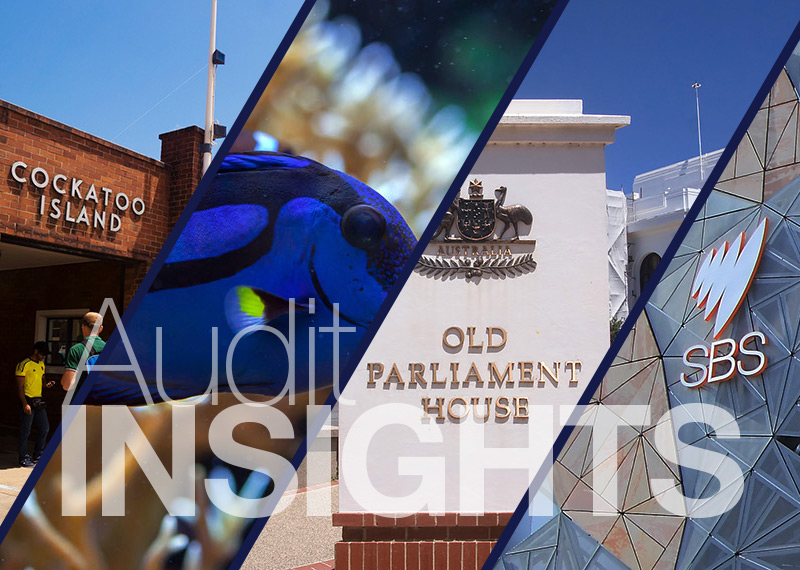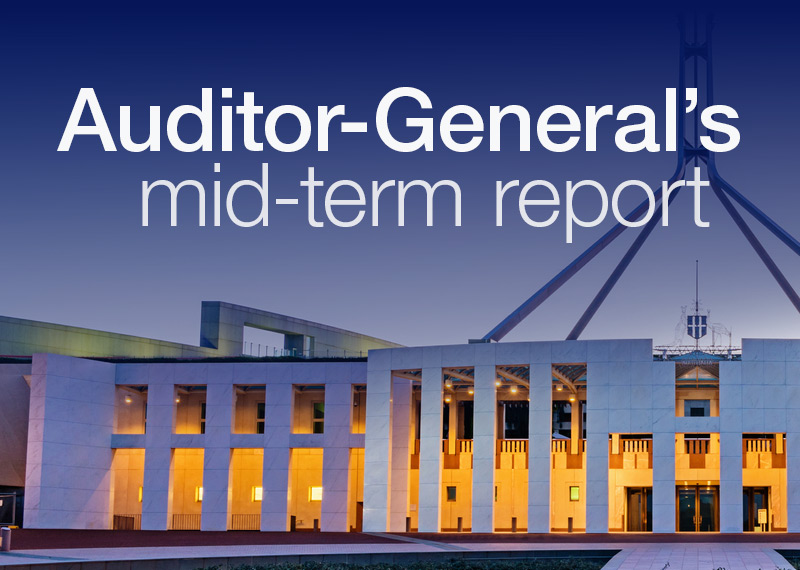Browse our range of reports and publications including performance and financial statement audit reports, assurance review reports, information reports and annual reports.
The report summarises the audit and other related activities of the ANAO in the period June to December 2000. It provides a consolidated report of the ANAO's integrated audit products tabled during the period. Key issues examined in the ANAO's performance audit activity in the period were:
- risk management in a corporate governance framework;
- outsourcing and asset sales;
- contract management;
- service delivery;
- data management/management information systems; and
- legislative implementation.
The report also summarised the results of a report summarising the final results of the audits of the financial statements of Commonwealth entities; and dealt with issues regarding financial management issues, controls and processes arising from the financial audit activities conducted during the period.
The objective of this follow-up audit was to provide assurance to the Parliament on the cost-effectiveness of public sector travel by:
- ascertaining the degree of acceptance, and the extent of implementation, of the previous audit recommendations and better practice principles; and
- establishing whether organisations were managing travel effectively, taking into consideration recommendations and findings detailed in the above Audit Reports and the Better Practice Guide Public Sector Travel.
The next Audit Committee Chairs Forum is scheduled for Friday, 5 December 2025. Further information about the forum will be announced closer to the event date. If you have any questions regarding the upcoming forum, please contact External.Relations@anao.gov.au.
For any enquiries, please contact External.Relations@anao.gov.au
The follow-up audit, Drug Evaluation by the Therapeutic Goods Administration [TGA], reviewed the extent to which TGA had implemented recommendations made by the ANAO in 1996 on the efficiency, effectiveness and accountability of TGA's evaluation and approval of prescription drugs for public use. This follow-up audit was conducted because of the importance of effective drug evaluation processes to public health.
This summary audit report brings together the results of the audits of the financial statements of all Commonwealth organisations (that is, agencies and statutory authorities), and is provided to the Parliament to assist in its scrutiny of annual reports and in the consideration of each organisation's financial statements.
This summary audit report brings together the results of the audits of the financial statements of all Commonwealth organisations (that is, agencies and statutory authorities), and is provided to the Parliament to assist in its scrutiny of annual reports and in the consideration of each organisation's financial statements.
The objective of this audit was to assess the effectiveness of the ANAO’s internal budgeting and forecasting processes and practices. View the audit.
This page lists status updates about the ANAO's progress on recommendations contained in the audit.
Please direct enquiries through our contact page.
This edition of audit insights draws together key learnings from Australian National Audit Office (ANAO) performance audit reports tabled in the Parliament of Australia from July to September 2017. It provides insights into entities’ operational implementation of government policies and frameworks, drawing on a number of common findings and key learnings on policy and program design, governance, performance and impact measurement, and risk management.
Please direct enquiries through our contact page.
The objective of this follow-up audit is to assess the Tax Office's progress in implementing the recommendations of Audit Report No.59 2002–03, Administration of Australian Business Number Registrations, having regard to any changed circumstances, or new administrative issues, affecting the implementation of those recommendations.
Mr Ian McPhee - Auditor-General for Australia, presented at the Canberra Evaluation Forum
Mr P.J. Barrett (AM) - Auditor-General for Australia, presented at the Security in Government 2001 SES Seminar
Mr P.J. Barrett (AM) - Auditor-General for Australia, presented at the Committee for Economic Development of Australia, Sydney, 30 Sept
Mr P.J. Barrett (AM) - Auditor-General for Australia, presented at the Security in Government 95 Conference, Canberra
Mr P.J. Barrett (AM) - Auditor-General for Australia, presented to the Conference on 'Surviving the Year 2000 Computer Crisis' Canberra
Mr Ian McPhee - Auditor-General for Australia, presented for a video-conference of the International Federation of Accountants
The Auditor-General wrote to the Minister for Finance on 21 June 2024 to advise of the outcomes of the 2023–24 annual performance statements audit program, and a proposal for expanding the program of audits in 2024–25 and the following two financial years. The Minister for Finance responded on 2 July 2024 supporting the proposal. The Minister for Finance's full response is provided below.
Please direct enquiries through our contact page.
The Auditor-General wrote to the Minister for Finance on 25 October 2022 to advise of the outcomes of the 2021–22 annual performance statements audit program, and a proposal for expanding the program of audits in 2022–23 and the following two financial years. The Minister for Finance responded on 16 January 2023 supporting the proposal. The Minister for Finance's full response is provided below.
Please direct enquiries through our contact page.
The Auditor-General wrote to the Minister for Finance on 26 June 2023 to advise of the outcomes of the 2022–23 annual performance statements audit program, and a proposal for expanding the program of audits in 2023–24 and the following two financial years. The Minister for Finance responded on 18 July 2023 supporting the proposal. The Minister for Finance's full response is provided below.
Please direct enquiries through our contact page.
Grant Hehir, Auditor-General for Australia, attended the Institute of Internal Auditors-Australia ‘Public Sector Internal Audit Conference’ on 31 July 2018, and presented an opening keynote session titled Strategic governance of risk: Lessons learnt from public sector audit. The accompanying paper to the speech, which was delivered against a conference theme of ‘internal auditor as a trusted advisor’, is available here.
Please direct enquiries through our contact page.
This report, which informs the Parliament on the audits of financial statements of Commonwealth entities for 1995-96, aligns with the Government's policy for timely public reporting of financial information. It provides a summary of the opinions formed on those organisations' financial statements and the matters and recommendations raised. Matters reported relate primarily to issues on internal control structures and information technology.
The objective of Phase Two of the audit was to examine the efficiency and effectiveness of operations of ATSIC Central, State and Regional Offices in relation to the administration of the Community Development Employment Projects Scheme. The ANAO established key criteria to assess progress against the implementation of the Phase One recommendations and further assess the efficiency and effectiveness of CDEP administration. The main areas examined were: planning, including reports of progress against plans and the development and use of performance information; monitoring, including client feedback and the review process at the Regional Office level; the implementation and effectiveness of management information systems in relation to CDEP; and the development and implementation of quality assuranced processes at State/Regional level.
The objective of this audit was to examine the effectiveness of the Attorney-General’s Department’s implementation of the recommendations from Auditor-General Report No.27 of 2017–18, Management of the Australian Government’s Register of Lobbyists.
Please direct enquiries through our contact page.
The Auditor-General responded on 23 December 2022 to correspondence from Senator Malcolm Roberts dated 29 November 2022, enquiring about public contributions to the Administration of the Disaster Recovery Funding Arrangements performance audit.
Please direct enquiries through our contact page.
The Auditor-General has responded to correspondence received from Senator Griff dated 11 April 2019, requesting that the Auditor-General provide as much detail as possible regarding the negotiation and awarding of contracts in the audit of the procurement of garrison support and welfare services.
Please direct enquiries relating to requests for audit through our contact page.
This was a follow-up of Audit Report No. 29 2000-01, Review of Veterans' Appeals Against Disability Compensation Entitlement Decisions. That audit examined the Department of Veterans' Affairs (DVA's) and the Veterans' Review Board's (VRB's) management of the review of decisions for disability compensation. The objective of this audit was to assess the extent to which DVA and the VRB had implemented the four recommendations of Report No.29 2000-01, taking into account any changed circumstances, or new administrative issues, affecting implementation of these recommendations.
This was a follow-up of Audit Report No. 40 of 1997-98, Purchase of Hospital Services from State Governments. That audit examined the administration by the Department of Veterans' Affairs of the Purchase of Hospital Services from State Governments. The objective of this audit was to assess the extent to which the Department had implemented the nine recommendations of Report No. 40, taking account of any changed circumstances or administrative issues that the Department identified as affecting their implementation; and to offer continued assurance to the Parliament on the management of the purchase of hospital services.
This audit would assess the effectiveness of measures the Northern Australian Infrastructure Facility has taken to strengthen the integrity and transparency in decision making regarding funding decisions for projects. As at 30 June 2024, there was $4.4 billion in committed loans.
Auditor-General Report No. 33 2018–19 Governance and Integrity of the Northern Australia Infrastructure Facility made six recommendations.
Please direct enquiries through our contact page.
Mr Mr Ian McPhee - Auditor-General for Australia, presented to the Ginninderra Rotary Club
Response completed as a limited scope assurance review.
The Auditor-General responded on 30 July 2014 to questions raised on 26 May 2014 by Senator the Hon Penny Wong on the appointment of Mr Peter Crone as head of Secretariat for the National Commission of Audit.
Please direct enquiries relating to requests for audit through our contact page.
This report presents the results of the interim phase of the 2009–10 financial statement audits of all portfolio departments and other major General Government Sector (GGS) agencies that collectively represent some 95 per cent of total GGS revenues and expenses.
The follow-up audit assessed the extent to which the Australian Taxation Office (ATO), Department of Health and Ageing (Health), and Medicare Australia had implemented the six recommendations from Audit Report No.47 2001–02, Administration of the 30 Per Cent Private Health Insurance Rebate. The audit also looked at: the implementation of some of the major suggestions for improvement in the original audit; and the current validity of some of the positive major findings from that audit. The audit found that the ATO, Health and Medicare Australia have acted upon the recommendations contained in Audit Report No.47 2001–02 and, overall, the administration of the Rebate is currently being undertaken effectively.
- Audit committee responsibilities for assurance over performance reporting can be supported by a structured assessment of both the individual performance measures and of the performance narrative as a whole.
The objectives of this follow-up audit were to:
- examine the ATO's implementation of the ten recommendations in The Australian Taxation Office's Management of its Relationship with Tax Practitioners (Audit Report No.19, 2002–03), having regard to any changed circumstances, or new administrative issues, affecting implementation of those recommendations; and
- identify scope for improvement in the ATO's management of its relationship with tax practitioners.
Follow up audits are recognised as an important element of the accountability processes of Commonwealth administration. Parliament looks to the Auditor General to report, from time to time, on the extent to which Commonwealth agencies have implemented recommendations of previous audit reports. Follow up audits keep Parliament informed of progressive improvements and current challenges in areas of Commonwealth administration that have previously been subject to scrutiny through performance audits.
This report complements the interim phase report, Audit Report No.51 2006–07 Interim Phase of the Audit of Financial Statements of General Government Sector Entities for the Year Ending 30 June 2007, and provides a summary of the final audit results of the audits of the financial statements of all Australian Government entities, including the Consolidated Financial Statements for the Australian Government.
This report complements the interim phase report released in June 2013 (Audit Report No.49 2012–13), and provides a summary of the final audit results of the audits of the financial statements of all Australian Government entities, including the Consolidated Financial Statements for the Australian Government.
Please direct enquiries relating to reports through our contact page.
This page lists status updates about the ANAO's progress on recommendations from the Australian Securities and Investments Commission (ASIC) audit inspection reports
Please direct enquiries through our contact page.
The report summarises the final results of the audits of the financial statements of Australian Government entities, being the second report this year on financial statements for the period ended 30 June 2003. It complements Audit Report No.61 2002-2003 Control Structures as part of the Audit of Financial Statements of Major Commonwealth Entities for the Year Ending 30 June 2003.
This report provides a summary of the final audit results of the audits of the financial statements of all Australian government reporting entities, including the Consolidated Financial Statements for the Australian Government.
This report summarises audit and other related activities of the Australian National Audit Office in the period January to June 1998.
This report summarises audit and other related activities of the Australian National Audit Office in the period January to June 1999.
This report is an information document summarising the audit activities of the ANAO in the period January to June 1997.
In 2000, the ANAO tabled Audit Report No 49 1999-2000, Indigenous Land Corporation operations and performance. The 2000 audit made nine recommendations for improvement. This follow-up audit examined the Indigenous Land Corporation's implementation of the recommendations of the 2000 audit.
Mr P.J. Barrett (AM) - Auditor-General for Australia, presented to the Australian Society of CPAs, Canberra
Mr P.J. Barrett (AM) - Auditor-General for Australia, presented at the Public Seminar Series, Graduate Program in Public Policy, 'Democratic Governance: Improving the Institutions of Accountability', The Australian National University
Mr P.J. Barrett (AM) - Auditor-General for Australia, presented to the ASCPA Annual Public Sector Accounting Convention, Canberra
Mr Ian McPhee - Auditor-General for Australia, presented at the World Bank Seminar, Washington DC By Teleconference
This report complements the interim phase report, and provides a summary of the final audit results of the audits of the financial statements of all Australian Government entities, including the Consolidated Financial Statements for the Australian Government.
The ANAO is responsible for the audits of the financial statements of all Australian Government entities. This report provides a summary of the final audit results of these entities, including the Consolidated Financial Statements for the Australian Government.
The focus of this report is on the year end results of the financial statement audits of all general purpose reporting entities for the 2004–05 financial year. Financial management issues (where relevant) arising out of the audits and their relationship to internal control structures are also included in this report.
The focus of this report is on the year end results of the financial statement audits of all general purpose reporting entities for the 2005–06 financial year. Financial management issues (where relevant) arising out of the audits and their relationship to internal control structures are also included in this report.
The ANAO is responsible for the audits of the financial statements of all Australian Government entities. This report provides a summary of the final audit results of these entities, including the Consolidated Financial Statements for the Australian Government.
The paragraphs numbered 5.213 to 5.216 in relation to Defence Housing Australia were tabled as an addendum to the Report.
A correction to the third bullet point of paragraph 5.120 was tabled as a corrigendum to the Report.
The Auditor-General Act 1997 establishes the mandate for the Auditor General to undertake financial statement audits of all Commonwealth entities including those of government agencies, statutory authorities and government business enterprises.
Financial statement audits are an independent examination of the financial accounting and reporting of public sector entities. The results of the examination are presented in an audit report, which expresses the auditor's opinion on whether the financial statements as a whole and the information contained therein fairly present each entity's financial position and the results of its operations and cash flows. The accounting treatments and disclosures reflected in the financial statements by the entity are assessed against relevant accounting standards and legislative reporting requirements.
Financial statement audits are an independent examination of the financial accounting and reporting of public sector entities. The results of the examination are presented in an audit report, which expresses the auditor's opinion on whether the financial statements as a whole and the information contained therein fairly present each entity's financial position and the results of its operations and cash flows. The accounting treatments and disclosures reflected in the financial statements by the entity are assessed against relevant accounting standards and legislative reporting requirements.
This report summarises the final results of the audits of the financial statements of Commonwealth entities, forming the second report this year on financial statement audits for the period ended 30 June 2000. It complements Audit Report No.52 1999-2000 Control Structures as Part of the Audits of Financial Statements of Major Commonwealth Agencies for the Period Ended 30 June 2000. The report is in three parts:
- Part One of the report is a commentary on the structure and status of the new financial framework, focusing on the quality and timeliness of the preparation of the annual financial statements;
- Part Two discusses the summary final results of the audits of the financial statements, providing details regarding qualifications and any matters emphasised in audit reports; and
- Part Three provides the results of the individual financial statement audits and any additional significant control issues identified since Audit Report No.52.
This report summarises the final results of the audits of the financial statements of Commonwealth entities, forming the second report this year on financial statement audits for the period ended 30 June 2001. It complements Audit Report No.1 2001-2002 Control Structures as Part of the Audits of Financial Statements of Major Commonwealth Agencies for the Period Ended 30 June 2001. The report is in five parts:
- Part One of the report discusses Commonwealth financial management and reporting issues. It also provides ongoing commentary on the structure of the Commonwealth's financial framework. Related reporting issues include developments in relation to the outcomes and outputs costing and appropriation framework. Comment is also made on the quality and timeliness of the preparation of entities' annual financial statements;
- Part Two provides details of the audit of the Commonwealth's Consolidated Financial Statements for 2000-2001;
- Part Three provides an overview of the current control issues noted in the financial statement audits of Commonwealth entities;
- Part Four discusses the summary final results of the audits of the financial statements, providing details regarding qualifications and any matters emphasised in audit reports; and
- Part Five provides the results of the individual financial statement audits and any additional significant control matters identified since Audit Report No.1 2001-2002.
This report summarises the final results of the audits of the financial statements of Commonwealth entities and represents the second report of the year on financial statement audits for the period ended 30 June 2002. It complements Audit Report No.67 2001-2002 Control Structures as part of the Audit of Financial Statements of Major Commonwealth Entities for the Year Ending 30 June 2002. The report is in five parts:
- Part One provides ongoing commentary on the structure of and issues in relation to the Commonwealth's financial framework;
- Part Two provides details of the audit of the Commonwealth's Consolidated Financial Statements for 2001-2002;
- Part Three summarises the final results of the financial statements with particular details regarding qualifications and any other matters emphasised in the audit reports;
- Part Four provides an overview of the results of the year end substantiation of financial balances and a summary of continuing significant accounting issues; and
- Part Five provides the detailed results of the individual financial statement audits and any additional significant control matters identified since Audit Report No..67 2001-2002.
Mr P.J. Barrett (AM) - Auditor-General for Australia, presented to the Senior Staff of the Board of Audit - Tokyo, Japan
Consistent with the ANAO's practices, and in response to a request from AusAID, a follow-up audit was conducted in the period May to November 1998 to assess the extent of implementation of the recommendations of a 1996 audit into the Management of Funding to Non-Government Organisations (NGOs)and whether the implementation of recommendations has effectively improved the management of funding to NGOs. The ANAO examined AusAID's key funding accountability documentation, tested the revised accountability arrangements and consulted a number of key stakeholders, including NGO representatives.
The objective of this audit was to assess the adequacy and effectiveness of the Australian Electoral Commission’s implementation of those recommendations relating to improving the accuracy and completeness of the electoral roll and other matters from Audit Report No.28 2009–10 that have not previously been followed-up by the ANAO.
Please direct enquiries relating to reports through our contact page.
This Report brings together the results of the audits of the financial statements of all Commonwealth organisations (that is, agencies and statutory authorities), including the Commonwealth Government of Australia consolidated financial statements for the period ended 30 June 1999.
The objective of the audit was to assess the adequacy and effectiveness of the Australian Electoral Commission’s implementation of those recommendations made in Report No. 28 2009–10 relating to:
- a more strategic approach to election workforce planning;
- the suitability and accessibility of polling booths and fresh scrutiny premises; and
- the transport and storage of completed ballot papers, in respect to matters not fully addressed in ANAO Audit Report No.31 2013–14.
Please direct enquiries relating to reports through our contact page.
The audit reviewed the extent to which the Department of Health and Ageing (Health) had implemented the recommendations of Audit Report No. 13 of 1998-1999, Aboriginal and Torres Strait Islander Health Program, taking account of any changed circumstances or new administrative issues identified as impacting the implementation of these recommendations.
Mr P.J. Barrett (AM) - Auditor-General for Australia, presented at the CPA Congress '96 - Profit from our Experience - Melbourne
The objective of this performance audit was to assess the effectiveness of the conduct of the first National Infrastructure Audit and development of the Infrastructure Priority List.
The objective of the audit was to assess the extent to which the Department of the Environment and Energy has implemented the recommendations from ANAO Report No. 43 2013–14 and strengthened its framework for the delivery of its regulatory activities.
Please direct enquiries relating to reports through our contact page.
The Auditor-General responded on 17 January 2017 to correspondence from the Hon. Linda Burney MP on 5 January 2017 requesting that the Auditor-General conduct an audit of the Centrelink debt recovery and welfare integrity programs.
Please direct enquiries relating to requests for audit through our contact page.
Mr P.J. Barrett (AM) - Auditor-General for Australia, presented at the National Public Sector Convention, Perth WA
This report presents the results of the interim phase of the 2007-08 financial statement audits of all portfolio departments and other major General Government Sector (GGS) agencies that collectively represent some 95 per cent of total GGS revenues and expenses. The results of the final audits of these departments and agencies will be included in a second report to be tabled in the Parliament in December 2008 following completion of the financial statement audits of all entities for 2007-08.
The focus of this report is on the year end results of the financial statement audits of all general purpose reporting entities for the 2005–06 financial year. Financial management issues (where relevant) arising out of the audits and their relationship to internal control structures are also included in this report.
The Auditor-General responded on 22 April 2022 to correspondence from Senator the Hon Eric Abetz dated 28 March 2022, requesting that the ABC’s defamation case payment be included as a topic in the ANAO’s Annual Audit Work Program 2022–23.
Please direct enquiries relating to requests for audit through our contact page.
The Australian National Audit Office has undertaken a pilot project to assess the status of the Australian Government performance measurement and reporting framework as a basis for implementation of a future program of audits of entities’ key performance indicators, and to develop a suitable audit methodology. This report presents a summary of the work completed to date.
This report presents the results of the interim phase of the 2004-2005 financial statement audits. The audits have encompassed a review of governance arrangements related to entities' financial management responsibilities, and an examination of internal control, including information technology system controls for all portfolio departments and other major General Government Sector entities as at 31 March 2005. An examination of such issues is designed to assess the reliance that can be placed on internal controls to produce complete and accurate information for financial reporting purposes. All ANAO findings have been reported to entities and summary reports provided to the relevant Minister(s).
The audit examined ATSIS' implementation of recommendations from Audit Report No.39, 1998-1999 National Aboriginal Health Strategy - Delivery of Housing and Infrastructure to Aboriginal and Torres Strait Islander Communities (the previous audit). In addition to assessing ATSIS' progress in implementing the recommendations of the previous audit, this follow-up audit examined ATSIS' performance reporting of the NAHS program, and concluded that the current level of aggregation of performance reporting makes it difficult to identify the particular contribution that the NAHS Program makes in improving services to Indigenous communities.
This report presents the results of the interim phase of the 2006–07 financial statement audits of all portfolio departments and other major General Government Sector (GGS) agencies that collectively represent 95 per cent of total GGS revenues and expenses.
The objective of the follow-up audit was to review the effectiveness of the DETYA International Services (DIS) cost recovery operational model. The initial audit of DIS was undertaken in 1997-98 (Audit Report No.35).
Mr P.J. Barrett (AM) - Auditor-General for Australia, presented at the CPA Australia's Government Business Symposium, Melbourne
Mr P.J. Barrett (AM) - Auditor-General for Australia, presented at the FINEST User Network Annual Conference 1996, Leura, NSW
Under section 57 of the Financial Management and Accountability Act 1997 (FMA Act) the Auditor-General is required to report each year to the relevant Minister, on whether the financial statements of agencies have been prepared in accordance with the Finance Minister's Orders (FMOs) and whether they give a true and fair view of the matters required by those Orders.
Our interim audits of agencies encompass a review of governance arrangements related to agencies' financial reporting responsibilities, and an examination of relevant internal controls, including information technology system controls. An examination of such issues is designed to assess the reliance that can be placed on internal controls to produce complete and accurate information for financial reporting purposes.
This report updates the ANAO's assessment of audit findings relating to major entity internal control structures, including governance arrangements, information systems and control procedures through to March 2004. The findings summarised in this report arise from the interim phase of the financial statement audits of major Australian Government entities for 2003/2004. Examinations of such findings are designed to assess the reliance that can be placed on control structures to produce complete, accurate and valid information for financial reporting purposes.
The Auditor-General Act 1997 establishes the mandate for the Auditor-General to undertake financial statement audits of all Australian Government entities including those of government agencies, statutory authorities and government business enterprises.
Our interim audits of agencies encompass a review of governance arrangements related to agencies’ financial reporting responsibilities, and an examination of relevant internal controls, including information technology system controls. The ANAO’s examination of these areas is designed to assess the reliance that can be placed on agencies’ internal controls to produce complete and accurate information for financial reporting purposes.
This report outlines the ANAO’s assessment of the internal controls of major agencies, including governance arrangements, information systems and control procedures. The findings summarised in this report are the results of the interim phase of the financial statement audits of 23 major General Government Sector agencies that represent some 95 per cent of total General Government Sector revenues and expenses.
Please direct enquiries relating to reports through our contact page.
This report outlines the ANAO’s assessment of the internal controls of major agencies, including governance arrangements, information systems and control procedures. The findings summarised in this report are the results of the interim phase of the financial statement audits of 24 major General Government Sector agencies that represent some 95 per cent of total General Government Sector revenues and expenses.
Please direct enquiries relating to reports through our contact page.
This summary audit report brings together the results of the audits of the financial statements of all Commonwealth organisations (that is, agencies and statutory authorities), and is provided to the Parliament to assist in its scrutiny of annual reports and in the consideration of each organisation's financial statements.
This report summarises audit findings relating to entity internal control structures arising from the interim phase of the financial statement audits of major Commonwealth entities for 2001-2002. Examinations of such issues are designed to assess the reliance that can be placed on control structures to produce complete, accurate and valid information for financial reporting purposes.
The report summarises audit findings relating to entity internal control structures arising out of the interim financial statement audits of 21 Major Commonwealth entities for the year ending 30 June 2003. The interim audit examinations seek to update the ANAO's assessment of the internal control environment of entities reviewed, so as to determine whether reliance can be placed on those control structures to produce complete, accurate and valid information for financial reporting purposes. In addition this year's report provides observations on some key strategic issues and influences which are, or will be in the future, likely to affect the overall financial framework in the public sector
Mr Mr Ian McPhee - Auditor-General for Australia, presented at the Global Working Group of Auditors-General, Stockholm, Sweden
This report summarises issues regarding financial systems, controls and processes from examinations of major Commonwealth organisations as part of the audits of their financial statements. It raises significant issues warranting attention to improve the quality of the underlying control structures that support public sector financial performance and accountability.
This report summarises issues relating to internal control structures, financial systems, controls and processes arising from the interim phase of the financial statement audits of major commonwealth entities for 2000-2001. Examinations of such issues are designed to assess the reliance that can be placed on control structures, systems, specific controls and processes to produce complete, accurate and valid information for financial reporting purposes.
- Parliamentary committee and Auditor-General recommendations seek to address risks identified through inquiries and audits. Audit committees are required to provide independent advice and assurance on entities’ systems of risk oversight and management and internal controls. Complete and regular reporting to audit and risk committees, including by providing evidence-based closure packs for completed parliamentary committee and Auditor-General recommendations, gives audit and risk committees visibility over how risks are being managed. This assists audit and risk committees to meet their advice and assurance functions.
The objective of the audit was to report the results of the interim phase of the audit of the 2011-12 financial statements of major General Government Sector agencies.
- Entities should include a rolling program of internal audits that examine key internal controls on a periodic basis.
Grant Hehir, Auditor-General for Australia, delivered a presentation titled A reflection of how far performance auditing has come from its roots in the 1970s to where we are today and where we are heading, at the IMPACT Conference in Brisbane on 15 March 2016.
IMPACT brings together Auditors-General, leaders, practitioners, industry experts and academics from across the globe to discuss the future of performance auditing in the public sector, share experiences and question current practices.
The Report summarised major issues in relation to financial systems, controls and processes from examinations of major Commonwealth agencies arising from the interim phase of their financial statements for the financial year 1999-2000.
The Auditor-General responded on 25 July 2022 to correspondence from former Senator the Hon Concetta Fierravanti-Wells dated 3 June 2022 requesting that the Auditor-General consider a request by Kollaras to examine the performance of the Australian Border Force’s administration of the ‘duty drawback scheme’ in 2019–20.
Please direct enquiries relating to requests for audit through our contact page.
This edition of audit insights outlines key messages from a series of recent audits examining the effectiveness of governance boards in four corporate Commonwealth entities. The audit observations from this series of audits relate primarily to the ‘soft’ attributes of effective governance such as relationships, behaviours and culture, while also recognising the important interplay with the ‘hard’ attributes of governance such as board composition, appointment processes and independence. The key messages may be relevant for the operations of other Commonwealth boards as well as broader governance arrangements in Commonwealth entities.
Please direct enquiries through our contact page.
Audit Lessons — Management of Corporate Credit Cards is intended for officials working in financial management or governance roles with responsibility for the management of corporate credit cards.
Please direct enquiries through our contact page.
- The adequate and timely implementation of agreed audit recommendations is an important element of realising the full benefit of those recommendations. It also serves to demonstrate the entity’s commitment to improving public administration and being accountable to parliament.
- An effective audit committee is central to an entity’s third line of defence, and should provide independent assurance to the accountable authority that governance, risk management and internal controls are effective. Accountable authorities should ensure their audit committees cover the range of functions required of them under the Public Governance, Performance and Accountability Rule 2014.
- Accountable authorities and audit committees play a key role in fostering and maintaining a culture of fraud awareness and prevention. Where programs involve payments going to providers, there should be organisational commitment to the prevention and detection of fraud and the identification and remediation of provider non-compliance. Strong leadership will champion continuous improvement to frameworks and processes through lessons learned.
- Board committees should receive reporting that relates to the range of functions set out in their charters to ensure they can support the board in the way intended. This is critical for audit committees in performing their required functions under the Public Governance, Performance and Accountability Act 2013.
Governance of Data is targeted at Australian Government officials in information governance roles and those who use data to achieve organisational objectives.
Please direct enquiries through our contact page.
Records Management is targeted at all Australian Government officials. It also benefits those in information management roles.
Please direct enquiries through our contact page.
The fifteenth Commonwealth Auditor-General of Australia, Grant Hehir, has prepared a mid-term report reflecting on his first five years in the role. The report presents a description and analysis of the role and impact of audit, as well as analysis of the financial audit and performance audit work of the Australian National Audit Office (ANAO). The report concludes with coverage of ANAO continuous improvement activities across audit quality, better communication, transparency, efficiency and workforce capability.
Please direct enquiries through our contact page.
This edition of Audit Insights summarises key messages for all Australian Government entities from a series of recent Australian National Audit Office (ANAO) performance audits assessing the planning and implementation of regulation activities. It discusses the importance of using available data and intelligence information to develop and execute risk-based regulatory activities targeted in proportion to the impacts of non-compliance.
Please direct enquiries through our contact page.
The objective of this audit is to assess the effectiveness of the Commonwealth Home Support Programme.
Please direct enquiries through our contact page.
The objective of this audit is to assess the effectiveness of the Department of Defence’s (Defence) administration of investigations.
Please direct enquiries through our contact page.
The objective of this audit is to assess the effectiveness of Services Australia’s management of the privacy of client information.
Please direct enquiries through our contact page.
The objective of this audit is to examine the effectiveness of the procurement and contract management of onshore-manufactured antivenoms and vaccines.
Please direct enquiries through our contact page.
The objective of this audit is to assess the effectiveness of Services Australia’s compliance with domestic and international travel requirements.
Please direct enquiries through our contact page.
The objective of this audit is to assess the effectiveness of the design and implementation of the Safer Local Roads and Infrastructure Program (SLRIP).
Please direct enquiries through our contact page.
The objective of this audit is to assess the effectiveness of the Department of the Treasury’s (Treasury) design and delivery of the Housing Australia Future Fund.
Please direct enquiries through our contact page.
The objective of this audit is to assess the effectiveness of Australian Securities and Investments Commission’s (ASIC) regulation of registered company auditors.
Please direct enquiries through our contact page.
The objective of this audit is to assess the effectiveness of the Department of Social Services’ (DSS) and Services Australia’s management of the age pension.
Please direct enquiries through our contact page.
The objective of this audit is to assess whether the Department of Defence (Defence) has complied with gifts, benefits and hospitality requirements.
Please direct enquiries through our contact page.
The objective of this audit is to assess the effectiveness of the Australian Taxation Office’s (ATO) management of small business taxpayer debt.
Please direct enquiries through our contact page.
The objective of this audit is to assess the effectiveness of the Department of Agriculture, Fisheries and Forestry’s (DAFF) compliance with domestic and international travel requirements.
Please direct enquiries through our contact page.
The objective of this audit is to assess the efficiency and effectiveness of the Department of Social Services’ (the department) administration of the National Redress Scheme (the Scheme).
Please direct enquiries through our contact page.
The objective of this audit is to assess the effectiveness to date of the Department of Defence’s (Defence) procurement of Infantry Fighting Vehicles (LAND 400 Phase 3).
Please direct enquiries through our contact page.
The objective of this audit is to examine whether the Department of Industry, Science and Resources (DISR) has implemented a selection of Auditor-General recommendations.
Please direct enquiries through our contact page.
The objective of this audit is to assess the effectiveness of the Office of the Official Secretary to the Governor-General’s (the Office’s) management of official residences and other assets.
Please direct enquiries through our contact page.





































































